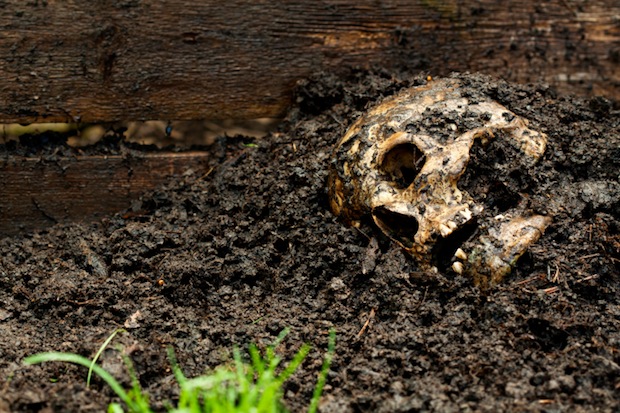Louise Welsh rarely repeats herself, a quality to celebrate in a crime novelist. Her latest novel, A Lovely Way to Burn (John Murray, £12.99, Spectator Bookshop, £10.99) is a dystopian thriller set in an all-too-plausible version of contemporary London. Three members of the establishment have shot dead innocent bystanders. The weather is broiling. A plague-like virus known as ‘the sweats’ spreads, bringing panic in its train. Stevie Flint, a cynical TV presenter on a shopping channel, is one of the few survivors. She contracts the disease shortly after stumbling on her boyfriend’s body. The boyfriend, a surgeon who apparently died of natural causes, had concealed a laptop in her loft shortly before his death. He was clearly on the track of something sinister, which is now after Stevie herself.
Once again, the apocalypse is here. Welsh puts her own distinctive mark on it. Billed as the first of a trilogy, this intelligent thriller creates an alarmingly convincing picture of London on the brink of disintegration; it reminds us how fragile we are. The character of Stevie is crucial to the novel’s success — she’s strong but vulnerable; above all, we care what happens to her. Some questions are left unanswered at the end, but we may safely infer that matters can only get worse in the rest of trilogy. I look forward to finding out how.
Belinda Bauer’s fifth novel, The Facts of Life and Death (Bantam, £14.99, Spectator Bookshop, £12.99), reprises one of the themes of her excellent debut, Blacklands: a child’s attempt to heal the wounds of a family. For most of the novel, the viewpoint is that of ten-year-old Ruby Trick, which lends an eerie intensity to the story. It’s set mainly in a hamlet crammed into a dank and claustrophobic combe on the north Devon coast. It’s a fairytale setting, but from the sort of fairytale that gives you nightmares.
Ruby’s world is full of terrors. Worst of all is her fear of losing her beloved daddy, an out-of-work welder who divides his time between fishing, drinking Strongbow and dressing up as a cowboy with his mates in the local pub. Someone begins to prey on local women, forcing them to phone their mothers to witness their distress. The terror escalates to murder. Meanwhile, the feud between Ruby’s parents grows increasingly bitter.
The novel lingers in the mind like an unwelcome guest, albeit one with a dark sense of humour. It offers a brilliant child’s-eye take on the horrors and mysteries of the world she inhabits. The adult reader is obliged to construct a parallel commentary that reveals what is really happening, with the help of other characters’ viewpoints. The result is powerful, compelling reading.
As a crime novelist — she is also a distinguished archaeologist — Fred Vargas is best known for her Commissaire Adamsberg novels. But she has another, linked series, The Three Evangelists, whose central characters are three historians. Dog Will Have Its Day (Harvill Secker, £14.99, Spectator Bookshop, £12.99), translated by Siân Reynolds, is the second in this sequence, though the central character is Louis Koch, an enigmatic former police officer from the Adamsberg books who keeps a pet toad in his pocket. It was originally published in France in 1996.
The novel starts with Louis finding a fragment of human bone embedded in dog excrement on a Paris pavement. This leads him, and the Evangelists, to murderous matters in a Breton village. But, as ever with Fred Vargas, the pleasure lies as much with the characters and in the texture of the writing as in the slyly effective plot, which gently enfolds the reader in its coils. This is wonderful, quirky stuff, a world away from formulaic crime fiction.
Success breeds imitation. Lord Peter Wimsey and Philip Marlowe have survived their creators; Sherlock Holmes has appeared in more stories since Conan Doyle’s death than he did before it; and a new Poirot is in the works. Now Margery Allingham’s protagonist returns, courtesy of Mike Ripley. Based on a fragment (itself a pastiche) written by Allingham’s husband, Mr Campion’s Farewell (Severn House, £19.99, Spectator Bookshop, £17.99) is set in 1969 in a picturesque Suffolk wool town (sketchmap provided), which is quietly controlled by a self-perpetuating syndicate. It is also riddled with legend, mystery and criminality. Albert Campion, visiting an artistic niece, is tempted out of semi-retirement to do a spot of gentlemanly adventuring. He is showing his age — he was never one of those detectives who are frozen in time — which adds to his appeal.
The novel is an engaging homage to a great Golden Age detective. Mike Ripley has a sense of humour that Margery Allingham would have enjoyed. He has also done a very good job of creating the ambience of a Suffolk town more that half a century ago. It’s good to know that Campion’s ‘farewell’ is only temporary — a sequel is in the works.






Comments